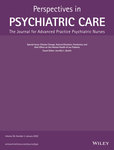Factors associated with antenatal depression during the COVID-19 (SARS-CoV2) pandemic: A cross-sectional study in a cohort of Turkish pregnant women
Abstract
Purpose
To determine the effect of the COVID-19 pandemic on antenatal depression in Turkish pregnant women.
Design and Methods
In this cross-sectional study, data were collected from 497 pregnant women between May and July 2020 using the Edinburgh Depression Scale (EDS) to determine the effect of obstetrics history, fear of hospitalization, concerns about the pandemic, birth, and the health of both mother and infant, on antenatal depression during the COVID-19 outbreak in Turkey.
Findings
The general EDS mean score of the total group was determined as mean 13.70 ± 6.22, which was higher than the critical cutoff point of 13. According to the multiple linear regression model applied in the study, the best predictive variables for the mean EDS score were determined to be concerned about completing a healthy pregnancy (r = −0.45), social media and news programs related to COVID-19 increasing levels of concern (r = −0.31), fear of hospitalization as the birth approaches (r = −0.45), having bad dreams during the COVID-19 pandemic (r = −0.41), the request for an elective cesarean delivery because of fear of catching COVID-19 (r = −0.40), fear of breastfeeding the infant (r = −0.45), and concerns that their own health would be negatively affected because of the pandemic (r = − 0.39), and these variables affected the mean EDS score negatively (total variance 40.5%, R = 0.642).
Practical Implications
The COVID-19 pandemic has created an urgent need to implement specific antenatal programs to promote the psychological health of pregnant women and reduce antenatal depression during this or similar crises.
CONFLICT OF INTERESTS
The authors declare that there are no conflict of interests.
Open Research
DATA AVAILABILITY STATEMENT
The data that support the findings of this study are available on request from the corresponding author. The data are not publicly available due to privacy or ethical restrictions.




